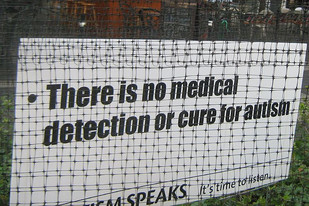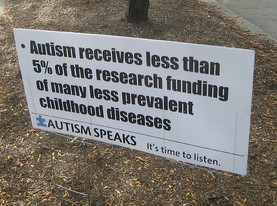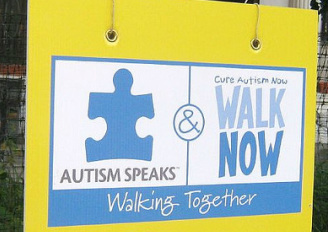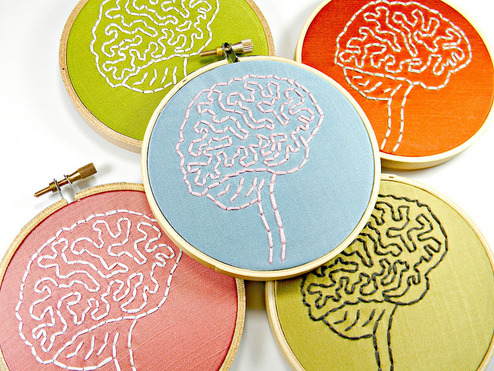Autism Controversies
One of the things I didn't realize when I started learning about autism was how very controversial the issues surrounding the disorder are. I found out for the first time talking to a friend from middle school, who turned out to be on the spectrum. When he told me he had Asperger's, I mentioned I had raised several hundred dollars for Autism Speaks, an accomplishment that I, a high schooler, was very proud of. I don't remember his exact reply, but it was along the lines of him wishing I hadn't.
That's right - even Autism Speaks is extremely controversial, and it's not the only controversial issue. This page is set up to introduce you to the controversies of autism, so that you have a better understanding of the discussions and can hopefully form your own opinion.
There are five main categories of controversies you may run into in discussions of autism - cause, cure, research, treatment, (as I mentioned before) Autism Speaks and other organizations, and the concept of neurodiversity. I will attempt to present both sides of each controversial issue equally and as impartially as I can here.
That's right - even Autism Speaks is extremely controversial, and it's not the only controversial issue. This page is set up to introduce you to the controversies of autism, so that you have a better understanding of the discussions and can hopefully form your own opinion.
There are five main categories of controversies you may run into in discussions of autism - cause, cure, research, treatment, (as I mentioned before) Autism Speaks and other organizations, and the concept of neurodiversity. I will attempt to present both sides of each controversial issue equally and as impartially as I can here.
1. The Cause
The cause of autism is extremely controversial. You may have heard of the vaccine controversy surrounding autism, which has now been thoroughly refuted by science. That was just one of the more publicized attempts to find the cause of autism, an effort that has been a rocky road indeed. One of the earliest attempts to find a cause, in fact, blamed a child's autism on the mother. At the time, mothers of children with autism were labeled "refrigerator mothers" and told they caused their child's autism by not being affectionate enough to them. This supposed cause was completely disproved, but reflects the fact that the search for a cause and an answer stretches all the way back in the history of autism; and the potential for damage that false 'causes' are laden with.
Ultimately, most (but not all) people and, in particular, scientists, do agree that genes play a role in autism; how large a role in comparison to the environment, however, is the subject of much debate, although most agree that genes are at least the dominant force.
Which environmental factor plays a role in the cause is also hotly debated. I have read/heard theories and speculation about everything from autism being caused/contributed to by vaccines, gluten, cell phone radiation, certain types of sugar, GMOs, traumatic births, childhood illnesses, and even - in one case - a spider bite. I honestly couldn't list all of the theorized causes if I tried, but those are just some of the ones I've heard. As you'll note, most have been found to have little to no scientific validity (most scientists are now zeroing in on causes in-utero as being more likely out of environmental effects). Among those theorized environmental links, gluten and vaccines/mercury are the most frequently mentioned ones I've encountered.
I cover some of what science has to tell us about the cause in the What Causes Autism? article, but for now, know that it's very controversial.
Ultimately, most (but not all) people and, in particular, scientists, do agree that genes play a role in autism; how large a role in comparison to the environment, however, is the subject of much debate, although most agree that genes are at least the dominant force.
Which environmental factor plays a role in the cause is also hotly debated. I have read/heard theories and speculation about everything from autism being caused/contributed to by vaccines, gluten, cell phone radiation, certain types of sugar, GMOs, traumatic births, childhood illnesses, and even - in one case - a spider bite. I honestly couldn't list all of the theorized causes if I tried, but those are just some of the ones I've heard. As you'll note, most have been found to have little to no scientific validity (most scientists are now zeroing in on causes in-utero as being more likely out of environmental effects). Among those theorized environmental links, gluten and vaccines/mercury are the most frequently mentioned ones I've encountered.
I cover some of what science has to tell us about the cause in the What Causes Autism? article, but for now, know that it's very controversial.
2. A Cure
Several elements of the cure conversation are controversial. First are stories of people who have been cured of autism. There have been many reported cases of individuals cured of autism. However, the main consensus remains that there is no cure for autism (as seen declared on the Autism Speaks sign above), merely treatments that help with symptoms. Most instances of apparent cures are generally said to have occurred because of misdiagnosis, such as in the case of Jenny McCarthy's son, or reducing deficits to the point of losing the diagnosis (the autism remains, the person just has developed good coping techniques to allow them to act neurotypical).
The second, still more controversial, side of the cure conversation is whether or not a cure is even necessary, or a good idea - this tends to divide into a 'cure camp' and an 'acceptance camp'. In the cure camp, many groups such as Cure Autism Now (which has since merged with Autism Speaks) campaign for a cure for autism. Naturally, many parents (and even some people with autism, as you can see in the below video) belong to this group and see a full autism cure as the best outcome and a way to save the person with autism from the world they're trapped in.
The second, still more controversial, side of the cure conversation is whether or not a cure is even necessary, or a good idea - this tends to divide into a 'cure camp' and an 'acceptance camp'. In the cure camp, many groups such as Cure Autism Now (which has since merged with Autism Speaks) campaign for a cure for autism. Naturally, many parents (and even some people with autism, as you can see in the below video) belong to this group and see a full autism cure as the best outcome and a way to save the person with autism from the world they're trapped in.
Cure Camp Video
On the other hand, many Autistic people say that even if there were a cure, they would not take it, as they see their autism as part of themselves and don't think they need saving, but rather, acceptance. As a result, there is a pro-acceptance movement, or certainly position, that has formed among many Autistics (how they refer to themselves) and a growing number of parents. This movement argues that autistics would benefit more from acceptance of them for who they are as opposed to attempts to find a cure.
Some parents protest against this movement on the grounds that its most prominent members are 'high functioning' and as a result, according to them, the movement does not apply to 'lower-functioning' individuals on the spectrum. However, this camp also has support from many autistics who society would normally consider 'low functioning,' such as the girl in the video below.
Some parents protest against this movement on the grounds that its most prominent members are 'high functioning' and as a result, according to them, the movement does not apply to 'lower-functioning' individuals on the spectrum. However, this camp also has support from many autistics who society would normally consider 'low functioning,' such as the girl in the video below.
Acceptance Camp Video
Naturally, in real life the differences between the cure camp and the acceptance camp might not be so clear cut. Someone could, for example, wish for a cure for autism but want acceptance for individuals with autism until such point that a cure is feasible. Others, such as the man in this anecdote, would not want a full cure but would take half of one, perhaps lowering the impact of certain symptoms while maintaining the core traits. My sister belongs to a similar group, wishing for a cure for her comorbid disorders (particularly her sensory processing problems) while desiring her autistic status to remain unchanged.
Others have suggested there are still more stances within the autism community, as discussed in The Four Kingdoms of Autism: Illness, Identity, Injury, and Insight, published by the National Institute of Mental Health, to which a person can ascribe to multiple at the same time (for example, beliefs falling under both Identity and Illness). I highly recommend reading the article, particularly its conclusion.
3. Treatment
Even treatments for autism can be controversial. Perhaps the subject of the most controversy is chelation, which removes heavy metals from the body and - particularly by those who believe thimerosol/mercury in vaccinations is the cause of autism - has been touted as a treatment. Unfortunately, chelation has not been supported by science as a treatment for autism. In addition, it can be quite dangerous, even leading to the death of one five year old boy with autism.
Another controversial treatment for autism includes aversive treatments, which are based in behaviorism. Basically, if the person with autism does something deemed bad, they receive an aversive stimulus, such as a painful shock, to train them not to repeat that behavior. This therapy is still in limited use to this day in the United States, and has led the United Nations to call for an investigation. A video of the school is below - warning, it shows a student being shocked.
Another controversial treatment for autism includes aversive treatments, which are based in behaviorism. Basically, if the person with autism does something deemed bad, they receive an aversive stimulus, such as a painful shock, to train them not to repeat that behavior. This therapy is still in limited use to this day in the United States, and has led the United Nations to call for an investigation. A video of the school is below - warning, it shows a student being shocked.
Other treatments are controversial not for questions of harm, but for questions of their effectiveness. Frequently the treatment for autism espoused by a person matches up with what they believe is the cause (or contributing factor) of autism. Therefore, someone who believes gluten/GMOs/certain types of sugar causes or contributes to autism might put their child on a diet free of the offending food as treatment. This move would naturally be controversial among those who believe solely genetics (or some other environmental factor) are the cause of autism. In return, parents who believe gluten/GMOs/certain types of sugar is a contributing factor to autism might look at other parents who don't put their children on such a diet as failing to treat their child. For those reasons, many treatments for autism are controversial.
4. Research
Again, this is a multifaceted issue. Much research about autism delves into the cause, cure, and treatments for autism. As you'll note, all three of these are controversial in of themselves. Beyond that, controversies over autism research fall into two categories: where the money for research goes and for what purposes the research will be applied.
In the first category, where the money for research goes, the allocation of research funds to study certain subjects can be controversial. For example, in 2009 Alison Singer, a board member of Autism Speaks, resigned in protest of the group's allocation of funding to researching autism and vaccines and started her own non-profit research fund, the Autism Science Foundation, which excludes research on vaccines. In explaining her reasoning, she said, "Dozens of credible scientific studies have exonerated vaccines as a cause of autism. I believe we must devote limited funding to more promising avenues of autism research."
Towards the latter point, the applications of said research, many people with autism fear that research into a cause of autism, culminating in prenatal screening for autism, may lead to selective abortions of fetuses who fall on the autism spectrum. They liken such abortions to eugenics, and point to the high abortion rate of fetuses with Down Syndrome as an example of what can result from prenatal screening.
In the first category, where the money for research goes, the allocation of research funds to study certain subjects can be controversial. For example, in 2009 Alison Singer, a board member of Autism Speaks, resigned in protest of the group's allocation of funding to researching autism and vaccines and started her own non-profit research fund, the Autism Science Foundation, which excludes research on vaccines. In explaining her reasoning, she said, "Dozens of credible scientific studies have exonerated vaccines as a cause of autism. I believe we must devote limited funding to more promising avenues of autism research."
Towards the latter point, the applications of said research, many people with autism fear that research into a cause of autism, culminating in prenatal screening for autism, may lead to selective abortions of fetuses who fall on the autism spectrum. They liken such abortions to eugenics, and point to the high abortion rate of fetuses with Down Syndrome as an example of what can result from prenatal screening.
5. Autism Organizations
Organizations that deal with autism often become rather controversial themselves. The two best examples I can think of are Autism Speaks and the Autistic Self-Advocacy Network (ASAN). If you're like most people, you've probably never heard of ASAN before. For Autism Speaks to make this list, however, may be more surprising.
Many people with autism argue that, while the organization is called Autism Speaks, since it includes no board members with autism it cannot truly speak for people with autism. They also contest that one of the main goals of the research it funds is prenatal screening (see #3, Research). Autism Speaks is also more aligned with the movement for a cure for autism, even eventually merging with Cure Autism Now, the idea of which was already mentioned on our list of controversies. You'll also note Autism Speaks is so pro-cure that I used a video from them to exemplify the "cure camp" in #2. On top of this, there are claims that they don't manage money well and stigmatize people with autism.
For all these reasons and more, my friend with Asperger's (who falls into the acceptance camp) chastised me for raising money for them. As you can see, because of its connection to so many controversial areas, Autism Speaks itself has become very controversial.* For more on that count, read An Autistic Speaks About Autism Speaks.
Many people with autism argue that, while the organization is called Autism Speaks, since it includes no board members with autism it cannot truly speak for people with autism. They also contest that one of the main goals of the research it funds is prenatal screening (see #3, Research). Autism Speaks is also more aligned with the movement for a cure for autism, even eventually merging with Cure Autism Now, the idea of which was already mentioned on our list of controversies. You'll also note Autism Speaks is so pro-cure that I used a video from them to exemplify the "cure camp" in #2. On top of this, there are claims that they don't manage money well and stigmatize people with autism.
For all these reasons and more, my friend with Asperger's (who falls into the acceptance camp) chastised me for raising money for them. As you can see, because of its connection to so many controversial areas, Autism Speaks itself has become very controversial.* For more on that count, read An Autistic Speaks About Autism Speaks.
The Autism Self-Advocacy Network (ASAN) is controversial for the exact opposite reason; it promotes acceptance of individuals with autism as opposed to a cure. They are so pro-acceptance that I actually used one of their videos to exemplify the acceptance camp in #2. Therefore, those who are in favor of a cure are likely to be opposed to their group.
For a better understanding of the controversial status of these organizations, read Nominee to Disability Council Is Lightning Rod for Dispute on Views of Autism, another great New York Times article from Amy Harmon, which focuses on ASAN, but deals with both of the organizations.
For a better understanding of the controversial status of these organizations, read Nominee to Disability Council Is Lightning Rod for Dispute on Views of Autism, another great New York Times article from Amy Harmon, which focuses on ASAN, but deals with both of the organizations.
6. Neurodiversity
A relatively controversial subject, neurodiversity is the idea that the world has lots of types of minds and we should embrace the diversity within them. To quote Wikipedia, which put it much better than I can in this article on the subject, "Neurodiversity is a concept suggesting that neurological differences be recognized and respected as a social category on a par with gender, ethnicity, class, or disability."
For many, neurodiversity is viewed not just as a concept but as a social movement. This movement understands neurodiversity as a variation of human wiring, rather than a disease. These activists reject the idea that neurological differences need to be cured as they believe them to be authentic forms of communication, self-expression and being. They promote support-systems that allow those who are neurologically different to live their lives as they are, rather than attempting to conform to a clinical ideal." If you want to read more on the subject, I would suggest reading Neurodiversity Forever: The Disability Movement Turns to Brains, by Amy Harmon from the New York Times.
Neurodiversity is controversial for many reasons, but, as with most autism issues, opinion generally splits along cure camp and acceptance camp lines. Most people in the acceptance camp are in agreement, many in the cure camp are in disagreement because thinking of autism as a mere variation in human wiring implies that it is to be accepted, not cured.
You can watch a clip in which the word is used in context and explained (and its controversy discussed) below:
For many, neurodiversity is viewed not just as a concept but as a social movement. This movement understands neurodiversity as a variation of human wiring, rather than a disease. These activists reject the idea that neurological differences need to be cured as they believe them to be authentic forms of communication, self-expression and being. They promote support-systems that allow those who are neurologically different to live their lives as they are, rather than attempting to conform to a clinical ideal." If you want to read more on the subject, I would suggest reading Neurodiversity Forever: The Disability Movement Turns to Brains, by Amy Harmon from the New York Times.
Neurodiversity is controversial for many reasons, but, as with most autism issues, opinion generally splits along cure camp and acceptance camp lines. Most people in the acceptance camp are in agreement, many in the cure camp are in disagreement because thinking of autism as a mere variation in human wiring implies that it is to be accepted, not cured.
You can watch a clip in which the word is used in context and explained (and its controversy discussed) below:
Side-note: Despite what the hosts say in the video, autism is a disorder, not an illness. Also, the interviewer says that people with autism are non-emotional, which is a myth about autism. Both of these serve as examples of how harmful myths are spread by the media, which is discussed more in The Negative Narrative.
Read More on This Subject
The Truth About Autism: Scientists Reconsider What They Think They Know - Wired
10 Myths About Autism - WrongPlanet (deals with controversies from an AS perspective)
*Autism Speaks is seeming to become more and more controversial as time passes. Just today I saw (without seeking them out) two more articles on the subject - What's Wrong with Autism Speaks and Look Me in the Eye: I Resign My Roles at Autism Speaks.
10 Myths About Autism - WrongPlanet (deals with controversies from an AS perspective)
*Autism Speaks is seeming to become more and more controversial as time passes. Just today I saw (without seeking them out) two more articles on the subject - What's Wrong with Autism Speaks and Look Me in the Eye: I Resign My Roles at Autism Speaks.
Up Next: All Kinds of Minds
The following article gives a view of the selective advantages autism provides, as well as examples of successful people on the spectrum.






